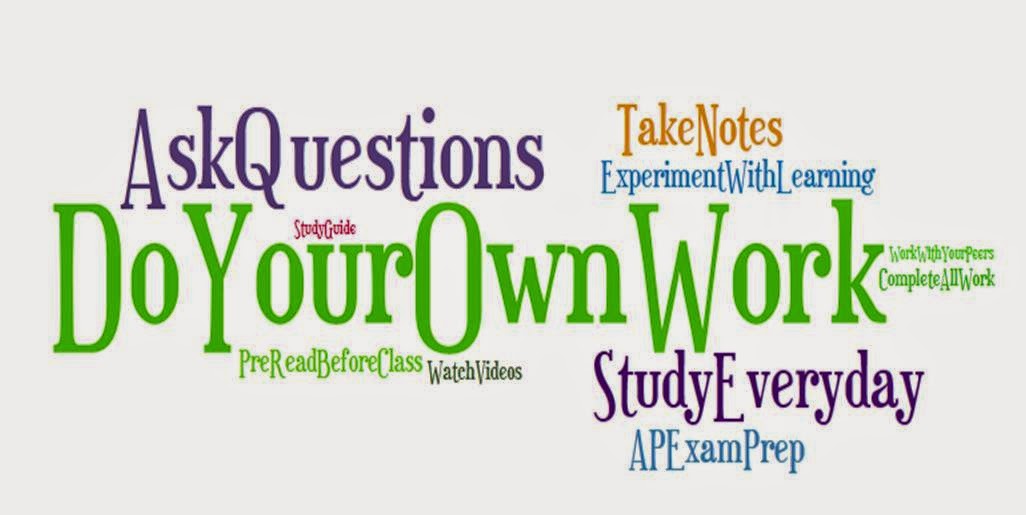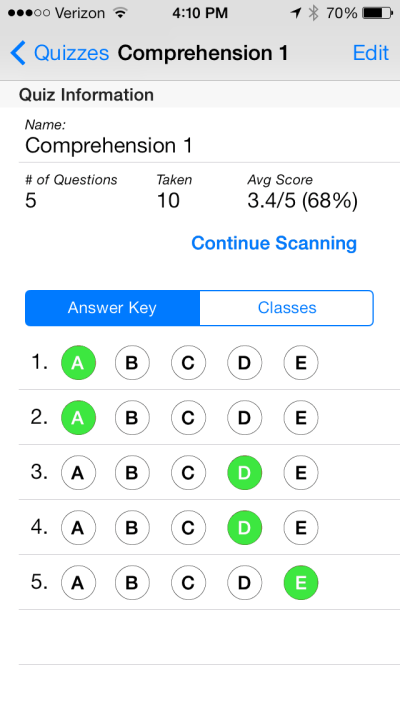I think that the word "studying"
is now synonymous with the term "reading my notes." At this point
in the year I am reviewing students for EOCs and AP exams and I am working hard
... and I think I am the only one. This is not new, this is not
surprising, and instead of complaining I am trying to figure out how to teach
students to study and how to take responsibility for their own learning ... and
how to implement this from the beginning of the year next year. I am
going to focus on AP Biology first and write about Biology EOC later.
It starts with expectations, right? So, what are my
expectations?
I
expect my students to pre-read before class. Pre-reading for AP Biology includes skimming assigned
sections of the book with special emphasis on terminology and figures. The
students need a base to add to during lectures, discussions and activities. Pre-readings are also required before watching
and taking notes from flipped videos.
There will be random reading pop-quizzes.
I expect my students to
watch all assigned videos. Our flipped videos have several
purposes. With video lecture students
can take notes at their own pace, return to video throughout the year if they
need to watch it again, and students are able to keep up with material when
they are absent.
I expect my students to take
notes. When students are assigned videos (my
video or “guest-speaker” video), or during in-class lectures, activities and
labs students are expected to take notes.
These notes serve as a reference of the most important information
covered and as a reminder of the applications of that material. Copying another
student’s notes from a video is not acceptable … watch the video.
I expect my students to have
questions and to ask questions. The ultimate goal is
understanding (not just memorizing) the material. When students have question they should write
those questions down. Questions can be
asked before school, after school, via twitter or facebook, or in class when
appropriate. Once questions have been
answered, the answer should be written down as well. If no one asks questions I do not know what
needs clarification.
I expect my students to
complete all work assigned to them. When assignments require
internet access (videos or MasteringBiology assignments) I will assign them as
early as possible to allow students to use the computers at school if
needed. Students are welcome to come in
before or after school to use the computer in my room or my iPad; the school library
and computer lab are also sometimes available. School policy is that any work
not completed when assigned can be turned in the next day for up to a 70. Any work not completed past that will receive
a zero. Students who have an excused
absence have 1 day per day missed to make up work for full credit. (EX: If you
are absent on Monday, any work that was due Monday is due Tuesday, and any work
assigned on Monday and due Tuesday will be due on Wednesday.)
I expect my students to obtain
and utilize a study guide. This can be the study guide provided by
the school, or one of the various study guides available for purchase
(Half-Price Books online or Amazon would provide cheapest options if an
additional resource is desired). These
resources provide students alternate explanations of material, practice
multiple-choice questions, and practice essay questions.
I expect my students to
study an hour a day. An hour everyday is more effective for
preparing for unit tests and the AP exam than several hours a day or two
before. Sometimes this could be on
review assignments, tutorials, activities, videos, animations or working on their
B.I.L.L.. I cannot pass the class or the
AP exam for the students, I cannot want it for them.
I expect my students to do
their own work. There are very few group assignments in AP
Biology. If it is a group assignment
that will be made clear and be written in the description of the assignment. Giving another student answers does not help
that student. Any form of cheating (“working
together,” copy & paste, editing someone else’s work and calling it your
own, “googling” the answers, looking on someone else’s answers, sharing
pictures of assignments or answers, etc.) will result in a zero for all parties
involved.
I expect my students to
prepare for their AP exam. The time in class is unfortunately not enough
to be adequately prepared for the AP exam.
Students are expected to put forth the necessary effort to make
themselves successful.
I expect my students to be
willing to work together. I know that sometimes students in an AP class
are competitive with one another. I
value competition, it is a great motivator, but we learn better together. It is us against everyone else taking this
test. We will be working in groups to
perform labs and to learn and discuss material.
Students will sometimes choose their groups and sometimes groups will be
drawn at random. Students are encouraged
to form a study group to discuss material, but only if students have the
integrity need to refrain from cheating.
I expect my students to
experiment with learning.
Students will be required to utilize
many learning techniques, including discussions, B.I.L.L., labs, creating
lessons and teaching peers, using technology, and more. Everyone learns differently, and next year
students will be expected to teach themselves, so we are will do a variety of different
activities so that the students are armed with a variety of tools for their
college career.
I am not even sure this is a complete list, but my brain hurts. Leave me comments about your expectations, or anything you think I should add.
Come back for my AP Links and Resources!






